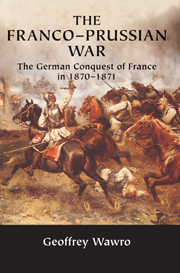Book contents
- Frontmatter
- Contents
- List of Abbreviations
- List of Illustrations
- Acknowledgments
- Introduction
- 1 Causes of the Franco-Prussian War
- 2 The Armies in 1870
- 3 Mobilization for War
- 4 Wissembourg and Spicheren
- 5 Froeschwiller
- 6 Mars-la-Tour
- 7 Gravelotte
- 8 The Road to Sedan
- 9 Sedan
- 10 France on the Brink
- 11 France Falls
- 12 The Peace
- Bibliography
- Index
12 - The Peace
Published online by Cambridge University Press: 20 July 2009
- Frontmatter
- Contents
- List of Abbreviations
- List of Illustrations
- Acknowledgments
- Introduction
- 1 Causes of the Franco-Prussian War
- 2 The Armies in 1870
- 3 Mobilization for War
- 4 Wissembourg and Spicheren
- 5 Froeschwiller
- 6 Mars-la-Tour
- 7 Gravelotte
- 8 The Road to Sedan
- 9 Sedan
- 10 France on the Brink
- 11 France Falls
- 12 The Peace
- Bibliography
- Index
Summary
Two men had made the Franco-Prussian War, and now only one remained to conclude it. The other, released from his post-Sedan captivity in Kassel, made his doleful way to England in March 1871, to begin his exile with the empress and prince imperial at Camden Place, a twenty-room mansion in Chislehurst, Kent. French republicans watched this gathering of Bonapartes nervously, for recent history suggested that they were, in Emile Zola's words, “a strange family that never dies, which goes on, with its pale and moribund children … with their pockets empty one day, then safes full of money the next. They live in palaces, they die on rocks. They mint coins with our blood. And they are still there, at our throats, or at the bottom of some ditch, watching us and ready to jump on our shoulders.” And yet here was one Bonaparte who would not clamber back; Louis-Napoleon would die of anguish and kidney stones in 1873. Lou-Lou the prince imperial – a Woolwich graduate in the meantime – would follow his father to the grave six years later, killed by Zulus at the age of twenty-three while riding in South Africa with the Natal Horse and attempting to burnish his military credentials for the role of Napoleon IV. Undisputed master of France and Central Europe, Bismarck – “the genius of the actual,” the European statesman most able to divine and interpret current trends – began to fumble in a most uncharacteristic and ultimately tragic way.
- Type
- Chapter
- Information
- The Franco-Prussian WarThe German Conquest of France in 1870–1871, pp. 299 - 314Publisher: Cambridge University PressPrint publication year: 2003

